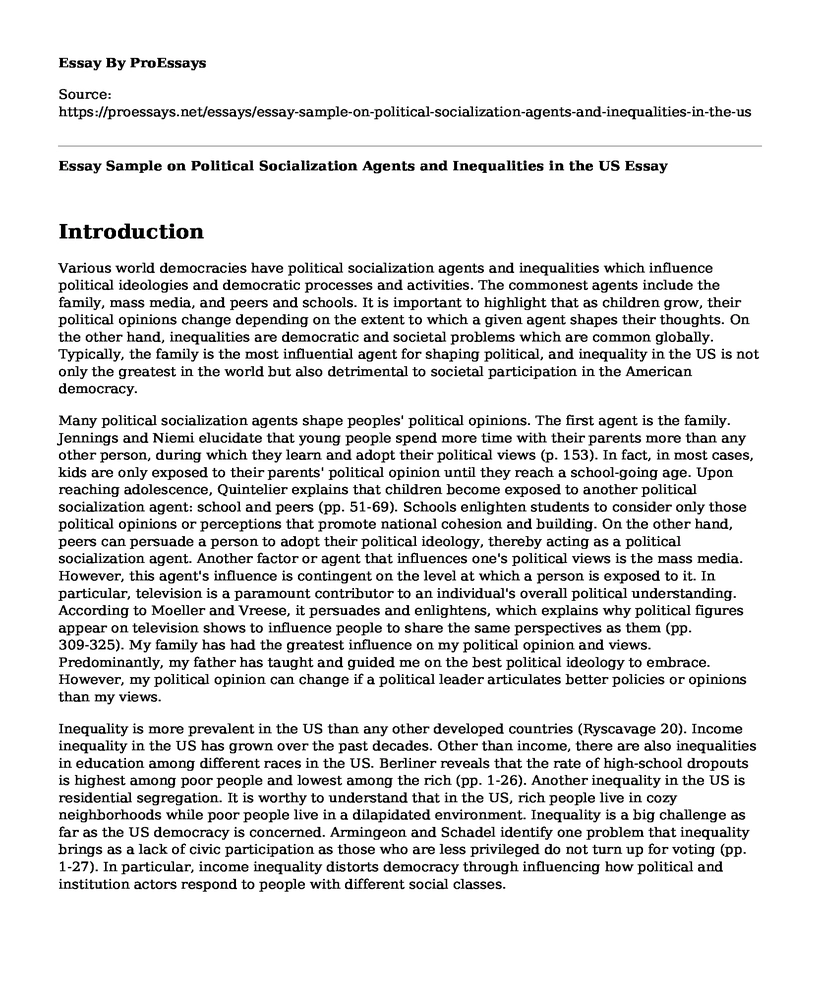Introduction
Various world democracies have political socialization agents and inequalities which influence political ideologies and democratic processes and activities. The commonest agents include the family, mass media, and peers and schools. It is important to highlight that as children grow, their political opinions change depending on the extent to which a given agent shapes their thoughts. On the other hand, inequalities are democratic and societal problems which are common globally. Typically, the family is the most influential agent for shaping political, and inequality in the US is not only the greatest in the world but also detrimental to societal participation in the American democracy.
Many political socialization agents shape peoples' political opinions. The first agent is the family. Jennings and Niemi elucidate that young people spend more time with their parents more than any other person, during which they learn and adopt their political views (p. 153). In fact, in most cases, kids are only exposed to their parents' political opinion until they reach a school-going age. Upon reaching adolescence, Quintelier explains that children become exposed to another political socialization agent: school and peers (pp. 51-69). Schools enlighten students to consider only those political opinions or perceptions that promote national cohesion and building. On the other hand, peers can persuade a person to adopt their political ideology, thereby acting as a political socialization agent. Another factor or agent that influences one's political views is the mass media. However, this agent's influence is contingent on the level at which a person is exposed to it. In particular, television is a paramount contributor to an individual's overall political understanding. According to Moeller and Vreese, it persuades and enlightens, which explains why political figures appear on television shows to influence people to share the same perspectives as them (pp. 309-325). My family has had the greatest influence on my political opinion and views. Predominantly, my father has taught and guided me on the best political ideology to embrace. However, my political opinion can change if a political leader articulates better policies or opinions than my views.
Inequality is more prevalent in the US than any other developed countries (Ryscavage 20). Income inequality in the US has grown over the past decades. Other than income, there are also inequalities in education among different races in the US. Berliner reveals that the rate of high-school dropouts is highest among poor people and lowest among the rich (pp. 1-26). Another inequality in the US is residential segregation. It is worthy to understand that in the US, rich people live in cozy neighborhoods while poor people live in a dilapidated environment. Inequality is a big challenge as far as the US democracy is concerned. Armingeon and Schadel identify one problem that inequality brings as a lack of civic participation as those who are less privileged do not turn up for voting (pp. 1-27). In particular, income inequality distorts democracy through influencing how political and institution actors respond to people with different social classes.
Conclusion
In conclusion, several political socialization agents influence political opinions. The family is the fundamental agent that shapes the political opinion of every person. It is also prudent to note that inequality is not only detrimental to the US but also more prevalent than in any other nation. It bars people from civic participation such as voting. In this regard, the US government needs to instigate measures that alleviate inequalities for a better democratic space.
Works Cited
Armingeon, Klaus, and Lisa Schadel. "Social inequality in political participation: The dark sides of individualization." West European Politics 38.1 (2015): 1-27.
Berliner, David. "Effects of inequality and poverty vs. teachers and schooling on America's youth." Teachers College Record115.12 (2013): 1-26.
Moeller, Judith, and Claes de Vreese. "The differential role of the media as an agent of political socialization in Europe." European Journal of Communication 28.3 (2013): 309-325.
Quintelier, Ellen. "Engaging adolescents in politics: The longitudinal effect of political socialization agents." Youth & Society 47.1 (2015): 51-69.
Ryscavage, Paul. Income Inequality in America: An Analysis of Trends: An Analysis of Trends. Routledge, 2015.
Cite this page
Essay Sample on Political Socialization Agents and Inequalities in the US. (2022, Jul 11). Retrieved from https://proessays.net/essays/essay-sample-on-political-socialization-agents-and-inequalities-in-the-us
If you are the original author of this essay and no longer wish to have it published on the ProEssays website, please click below to request its removal:
- Confucius, the Analects
- Research Paper on The Red Guards
- Korea Is Not a Good Country - Argumentative Essay
- Annotated Bibliography on Zimbabwe (Rhodesia)
- Essay on Comfort Women: Filipinas' Stories of Prostitution & Slavery Under Japanese Military
- Research Paper on Inclusive Development: Key Indicators & Reasons for Promotion
- Free Case Study Sample on Oil Platform Event: US Response to Iran's Attack in 1987-88







